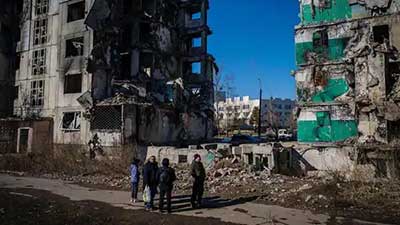Date: 27/02/2023
Relevance: GS-2: Effect of Policies and Politics of Developed and Developing Countries on India’s interests, Indian Diaspora; bilateral, regional and global groupings and agreements involving India and/or affecting India’s interests.
Key Phrases: Strategic Contours Of Europe's Post-Cold War Security Environment, Trans-Atlantic Alliance Nato, Virtues Of Geopolitics, Leadership Vacuum In The World Order, Multi-Alignment, Post-Cold War Global Order
Why in News?
- The Russian invasion of Ukraine on 24 February 2022 has not only provoked the largest armed conflict in Europe since World War II but has also set in motion geopolitical trends that are likely to change the contours of the post-Cold War global order.
Key Highlights:
- Russia's misadventure has once again proved that it is easier to start a war than to bring it to a conclusion, as ever after one year into the conflict, there is no sign of an end game.
- The Ukrainian resistance, helped by Western weapons, has been able to retain its defenses, but the human cost is still great. As a result, Russian forces are also struggling, and they have now turned to indiscriminate bombing of cities and infrastructure.
Contrasting Historical Narratives Shaping The Causes And Consequences Of This War:
- Russian forces have been smashing their way through Ukraine spurred in large part by historical fiction even as history also propels the fierce Ukrainian resistance.
- Despite the fact that history also pushes the tenacious Ukrainian resistance, Russian forces have been stomping their way across Ukraine, encouraged in large part by historical fiction.
- The history has a specific meaning for Ukrainians that spurs them on to battle and this battle is, in many ways, the clash of two incompatible historical narratives.
Europe’s Post-Cold War Security Landscape:
- On the ground, there is a clear stalemate and the war's result is still very unknown, but in just a year, the strategic contours of Europe's post-Cold War security environment have undergone a significant transformation.
- The Trans-Atlantic alliance Nato has been revived and Europe is once again seeing the virtues of geopolitics.
- Most significantly, in a decisive break from its post-World War II foreign policy of caution, Germany today is at a turning point in European history.
- Olaf Scholz, the German chancellor, was compelled to face the repercussions of Europe's unwillingness to adapt to the shifting strategic environment and acknowledge that it is now in a new era with the invasion of Ukraine.
- Berlin, formerly one of the strongest proponents of close ties with Russia has succeeded in significantly reducing its reliance on Russia for energy and has also announced a significant increase in defence spending to create a powerful, state-of-the-art, advanced army that protects Germany reliably.
- A fascinating power shift has occurred within the EU, with eastern European countries asking for and receiving a more forceful reaction against Russia.
- NATO is back in demand with its frontiers now actually reaching Russian doorsteps, something that was Russia’s justification for starting the war.
Impact Of War On Russia:
- For Russia, it has been a year of disastrous displays of incompetence at multiple levels.
- Its military prowess, the only remaining sign of being a big power, was revealed to be of little use.
- Due to major command-and-control and logistical weaknesses, an early invasion that was meant to conclude the war in days failed, prompting Russia to engage in partial mobilisation which caused unrest at home.
- As waves of aerial bombardment wreak havoc on helpless populations, the Russian approach is currently to wait and erode Western support for Ukraine.
- A significant escalation is possible without a guarantee of a settlement as Ukrainian forces strive to unite for an offensive.
- In terms of diplomacy, Russia is likewise slipping behind, with its standing eroding in Central Asia and the Caucasus, where it borders. Belarus, North Korea, Syria, and Eritrea are the only countries that explicitly support Russia.
- The majority of countries have been eager to strike a balance in their relations with Russia and the West, but China has made it clear that it won’t provide even one bullet to Moscow despite its declaration of a no-limits friendship but a year later, China is reportedly considering giving Russia lethal aid and the West has warned that this would entail crossing a red-line.
Conclusion:
- For much of the world, the food, fuel, and broader economic crisis brought on by the war has taken a huge toll.
- The world was just beginning to recover from the pandemic when Russia invaded Ukraine.
- The developing world has been the biggest loser with economic distress visible in many countries.
- For example, Bangladesh, Sri Lanka, and Pakistan have all struggled to pay their import bills.
- India, too, is fast learning that its extreme dependence on Russia for defense supplies has shrunk its strategic autonomy.
- Though the last few years have seen a leadership vacuum in the world order, which has given India the opportunity to demonstrate its leadership abilities but the global polarization and ongoing rivalry between the major powers will have a negative impact on India's ability to pursue multi-alignment successfully.
Source: Live Mint
Mains Question:
Q. The Russian invasion of Ukraine has not only provoked the largest armed conflict in Europe since World War II, but has also set in motion geopolitical trends that are likely to change the contours of the post-Cold War global order. Comment. (150 words).







